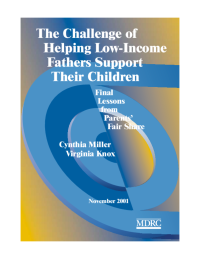The Challenge of Helping Low-Income Fathers Support Their Children
Final Lessons from Parents’ Fair Share
Fathers provide important financial and emotional support to their children. Yet low-income noncustodial fathers, with low wages and high rates of joblessness, often do not fulfill their parenting roles. The child sup- port system has not traditionally helped these men to do so, since its focus has been on securing financial support from fathers who can afford to pay. Meanwhile, fathers who cannot pay child support accumulate debts that can lead them to evade the system and its penalties altogether - and further limit their contact with their children.
Parents' Fair Share (PFS) was designed as an alternative to standard enforcement. Launched in 1994 in seven sites, PFS was a national demonstration program that aimed to help low-income noncustodial fathers find more stable and better-paying jobs, pay child support on a consistent basis, and become more involved parents. Funded by the organizations listed at the front of this monograph, PFS provided employment and training services, peer support groups, voluntary mediation between parents, and modified child support enforcement.
Besides designing the PFS demonstration, MDRC evaluated it. Between 1994 and 1996, each of more than 5,500 fathers was randomly assigned to PFS or a control group, and the program's effects were estimated by comparing how the two groups fared over a two-year period. This monograph synthesizes the demonstration's key findings and uses them to formulate several recommendations for the next generation of fatherhood programs.
Key Findings
As a group, the fathers were very disadvantaged, although some were able to find low-wage work fairly easily. PFS increased employment and earnings for the least-employable men but not for the men who were more able to find work on their own. Most participated in job club services, but fewer than expected took part in skill-building activities.
PFS encouraged some fathers, particularly those who were least involved initially, to take a more active parenting role. Many of the fathers visited their children regularly, although few had legal visitation agreements. There were modest increases in parental conflict over child-rearing decisions, and some mothers restricted the fathers' access to their children.
Men referred to the PFS program paid more child support than men in the control group. The process of assessing eligibility uncovered a fair amount of employment, which disqualified some fathers from participation but which led, nonetheless, to increased child support payments.
Recommendations for Future Programs
How to increase employment and earnings: Structure the program to encourage longer-term participation and to include job-retention services. Provide the fathers who cannot find private sector employment with community service jobs or stipends, or combine part-time work with training. Use providers who have experience working with very disadvantaged clients. Earmark adequate funding for employment services.
How to increase parental involvement: Increase fathers' access to their children by involving custodial mothers in the programs and providing the fathers with legal services to gain visitation rights. Be aware of the potential for increased parental conflict.
How to increase child support payments: Mandate fathers' participation in employmentrelated activities to increase payments among low-income caseloads. Encourage active partnership of fatherhood programs with the child support system.






